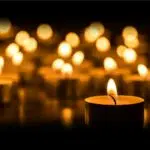Orthodox Easter Monday is also known as Bright Monday or Monday of Renewal in the Eastern Orthodox Church and the Catholic Churches of the Byzantine Rite. This year, it falls on April 13. If like us, you’re wondering why the Catholic celebration of Easter occurs on a Sunday while, in the east, the holy day is on Monday, the answer lies in the different adoption of the calendar by the orthodox and the unorthodox Christians. On the Julian calendar, the date is celebrated on Monday, and on the Gregorian calendar, Easter is celebrated on Sunday.
History of Orthodox Easter Monday
Easter is a central holiday for the Christian faith because it represents the resurrection of Jesus Christ. According to Christian belief, Jesus came back to life three days after dying on the cross. Easter dates vary from year to year since its calculation is based on the phases of the moon. The Easter full moon is the first full moon that occurs after March 21, a date that approaches the March equinox.
Every year, Easter is celebrated by Catholic Christians on the first Sunday after the Easter full moon, but this is not so for Orthodox Christians, who celebrate Easter on the first Monday after the Easter full moon. Due to the complexity of the calculation, the Easter date took a long time to be reduced to two days — Sunday for Catholics and Monday for Orthodox Christians. In fact, in the first centuries of Christianity, Easter celebrations took place on several different days, occupying well over a week if we consider the first Christian populations of the Middle East and Europe.
In 325, by order of the Roman Emperor Constantine I, Christian bishops gathered to consolidate religious rites and festivals at the first Council of Nicea. The formula for calculating the date of Easter became known as the Ecclesiastical Calculation. For Eastern Christianity, although Easter Monday is the most important day, the celebration still takes up an entire week, which is known as the Bright Week.
Orthodox Easter Monday timeline
Three days after dying on the cross, Jesus comes back to life.
The Roman Emperor Constantine I convokes the Council of Nicaea, which establishes the formula for calculating the day of Christ's resurrection, consolidating the Easter festivities.
Internal quarrels split the church into two sides: the Catholic in the west and the Orthodox in the east, leading to the celebration of similar events on different dates.
In February, Pope Gregory XIII issues a papal bull instituting the Gregorian calendar in much of Catholic Europe.
Orthodox Easter Monday FAQs
Do Greek Orthodox churches celebrate Easter Monday?
Yes, many Orthodox churches around the world observe Easter Monday.
Is Easter Monday considered a holiday?
Easter Monday is a public holiday in some countries, but not in the U.S.
What happened the day after the resurrection?
It is believed that after His resurrection, Jesus Christ appeared to His disciples on different occasions over the next forty days, giving them convincing proof of His coming back to life. During these visits, He ate with them and told them about the kingdom of God and the Great Commission.
Orthodox Easter Monday Activities
Bath in holy water
In countries like Poland and Slovakia, people try to drench each other in holy water during Orthodox Easter Monday. You may visit a church and be baptized in holy water to participate in this Christian tradition.
Treat yourself to some chocolate
The Easter egg is a symbol of the resurrection of Jesus Christ as eggs are a symbol of new life. The good news for kids is that easter eggs can be made from chocolate!
Let the egg roll
In the U.S., Easter Monday is not commonly celebrated. Every year, however, the White House sponsors the annual Easter Egg Roll, an endurance competition that involves rolling the eggs down a hill and watching to see which ones make it to the bottom intact.
5 Facts About Easter That Will Blow Your Mind
The second biggest candy holiday
Easter is the second biggest candy holiday after Halloween.
The Easter Bunny is relatively modern
It was in 1680 that the very first story of a bunny hiding eggs in a garden was published, inspiring the Easter Bunny concept.
It's the biggest chocolate festival
For every four chocolates eaten during the year, three are consumed at Easter, the most important holiday for the chocolate industry.
It’s important for the economy
Annually, people spend about $22 billion on Easter-related things.
Easter sweets go beyond chocolate
In the U.S., people also consume a lot of jelly beans during Easter, more than 15 million of them a year!
Why We Love Orthodox Easter Monday
It's a time of hope
In the Christian religion, the Easter holiday celebrates Jesus Christ’s miraculous resurrection from death. It represents the rebirth of hope and life.
It brings loved ones together
Easter is celebrated with long and joyful parties where family and friends meet and strengthen their bonds. It is also celebrated in church with services that embrace united worship and fellowship.
It celebrates the resilience of life
In celebrating the resurrection of Christ, Easter values the resilience of life. The distribution of Easter eggs is a reminder that life always starts over.
Orthodox Easter Monday dates
| Year | Date | Day |
|---|---|---|
| 2024 | May 6 | Monday |
| 2025 | April 21 | Monday |
| 2026 | April 13 | Monday |

















